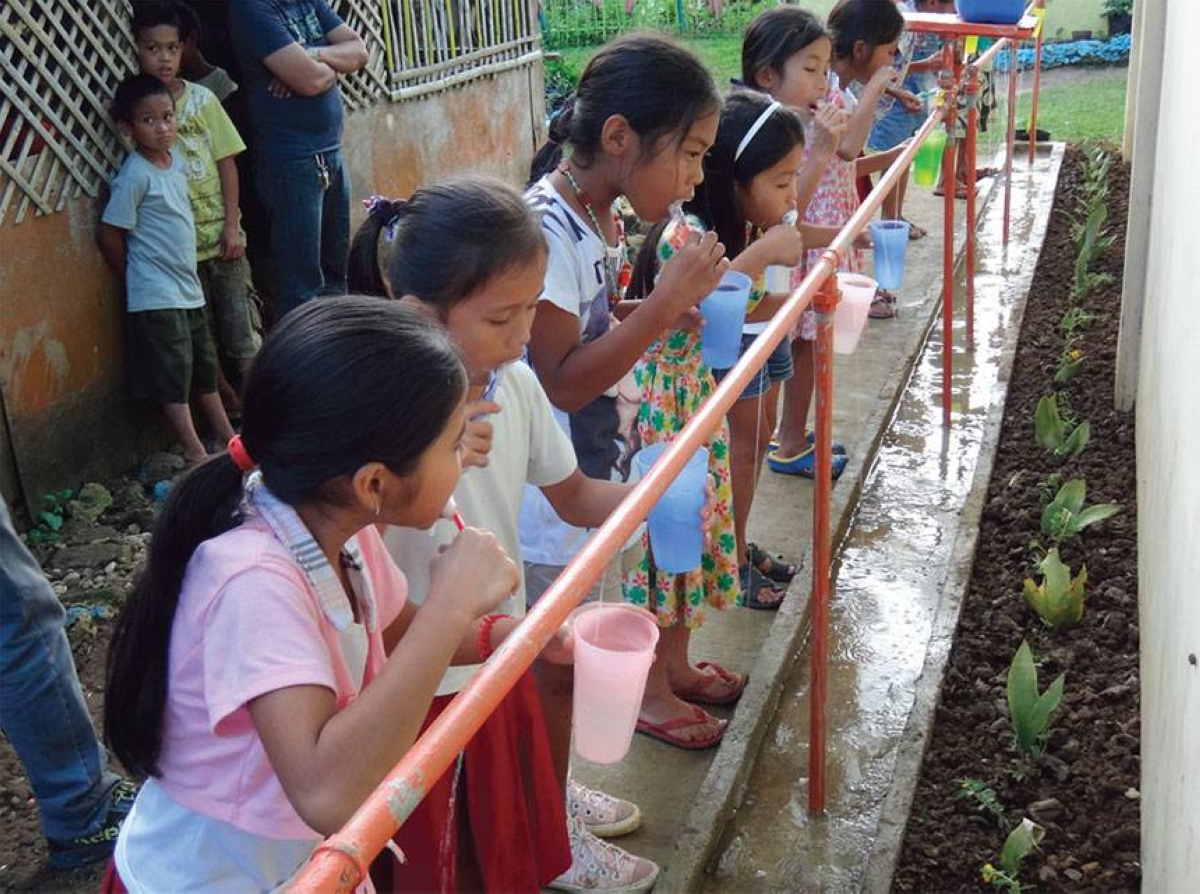
[ad_1]

Daily tooth-brushing in Philippine colleges, like this elementary faculty in Guihulngan City, Negros Oriental, was pioneered by the foreign-funded Fit for School mission. PHOTO BY MARIT STINUS-CABUGON
TODAY, Nov. 28, 2022, begins the primary session of the Intergovernmental Negotiating Committee that’s tasked with drafting a legally binding instrument on plastic air pollution. While plastic air pollution is an issue in itself, the manufacturing, use and disposal of fossil-fuel derived plastics are additionally tied to the broader situation of local weather change. The assembly, dubbed the INC1, comes on the heels of COP27. Considering the hyperlink between plastics and local weather change, it’s paramount that INC1 delegates gathering in Punta del Este, Uruguay, lay the foundations for a robust Global Plastics Treaty.
Climate change, choking plastic air pollution, a Covid-19 pandemic that continues to rear its ugly face, the murderous struggle on Ukraine and all its devastating results — these overwhelming realities however, the World Health Organization reminds us that oral well being care wants our consideration too, and now.
According to the “Global oral health status report — towards universal health coverage for oral health by 2030,” launched Nov. 18, 2022, an estimated 3.5 billion individuals — 44 p.c of the world’s inhabitants — endure from oral illness. The most typical oral illness is untreated caries of everlasting enamel. Its afflicting an estimated 2 billion individuals makes it essentially the most widespread non-communicable illness.
The report stated 514 million kids endure untreated caries of their child enamel (deciduous or first enamel) making such a situation the “single most common chronic childhood disease” worldwide.
WHO defines dental caries as “a gradual loss and breakdown (decay) of tooth hard tissues (enamel and dentine) that results when free sugars contained in food or drinks are converted by bacteria into acids that destroy the tooth over time.” And what are free sugars? They are “all sugars added to foods by the manufacturer, cook or consumer, plus sugars that are naturally present in honey, syrups and fruit juices. Caries can lead to cavities, which are permanently damaged areas in the hard surface of the teeth…”
Consumption of free sugars, the WHO says, “is the most important risk factor for dental caries … High sugar consumption is directly related to higher caries activity, and restricting intake of sugar decreases incidence and severity of dental caries.” Yet, companies which can be manufacturing sugar-filled meals and drinks, regardless of the apparent hyperlink between consumption of their merchandise and poor oral well being, search to affect well being and schooling sectors “to give themselves a socially responsible image, including for example, sponsorship of school activities and sporting events.” WHO warns that, “With sophisticated marketing, promotion and sales approaches, these industries seek to influence consumer behavior and create an environment where their products are universally available, affordable, accessible and appealing — a powerful and potent threat to population oral health.”
While meals and drinks that destroy our enamel are universally obtainable and inexpensive, even essentially the most fundamental of oral well being care is not. According to the oral well being nation profiles, even fluoride toothpaste is taken into account unaffordable within the Philippines with 1.2 labor days wanted to purchase an annual provide of fluoride toothpaste per individual. By comparability, in Thailand and Singapore an individual must work 0.6 and 0.1 days solely, respectively, to earn sufficient to purchase a yr’s provide of toothpaste. A mix of excessive value of the toothpaste and low per capita earnings makes toothpaste of the beneficial high quality and amount unaffordable to the common Filipino.
Thailand is recognized as a job mannequin within the Global South by having routine or preventive oral well being care, in addition to important and superior healing oral well being care by lined government-funded well being care insurance coverage. WHO’s bold purpose is — because the title of its report states — to have oral well being included in common well being protection in all member states by 2030. In the Philippines, I perceive, oral well being care isn’t but lined by PhilHealth apart from some surgical procedures. The Department of Education is selling oral well being by means of every day tooth brushing with fluoride toothpaste although that is executed solely in colleges which can be being equipped with toothpaste. Commercial fluoride toothpaste is dear however less expensive beneficial fluoride-concentration-compliant, regionally produced options are literally obtainable. WHO strongly recommends that, “Measures to promote the production, marketing and sustained use of fluoride toothpaste need to be taken to counter observed trends of increasing market share of non-fluoridated toothpaste in some countries. Product quality and the sale of counterfeit products should be controlled regularly.” A testing of various manufacturers of toothpaste some years in the past revealed that a number of manufacturers being offered within the Philippines did not include the minimal beneficial focus of fluoride.
Poor oral well being might not be life-threatening. However, as identified by Habib Benzian and colleagues of their commentary to the WHO report (The Lancet, Nov. 18, 2022), “The cumulative negative impacts of oral disease on societies and economies are unacceptable and adversely affect human development.” It can be much more unacceptable to fail to take decisive steps in direction of addressing poor oral well being contemplating the provision of inexpensive and cost-effective interventions.
[adinserter block=”4″]
[ad_2]
Source link